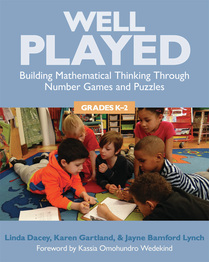 A couple of days ago I tweeted that I thought I was going to like this resource and some folks asked me to let them know my thoughts. Well, as I thought, this book did not disappoint! Authors Linda Dacey, Karen Gartland, and Jayne Bamford Lynch share some engaging new number games and puzzles and twists on old favourites like "Go Fish Numbers" (e.g., students search for "packs" of three matching representations of a given number). They also share a few free online games for each conceptual area. Although I really liked the games/puzzles in the book, what impressed me the most were the points they raised around the teaching of games/puzzles; these were highly insightful! Some of my take aways from the book include:
My only suggestion (and this is for the editor) - is that I wish there was an online url link where I could go and print out the blackline masters in the standard 8.5 x 11 size. It is just a minor detail but one that would save me time and as teacher, that is something we could all use more of. I highly recommend this resource and intend to use it this coming year!
0 Comments
Leave a Reply. |
About Me
I am a Numeracy Helping Teacher with the Surrey Schools District. Each day I am thankful for being able to work with amazing students and teachers in an area I am passionate about ~ Mathematics! Subscribe:Click the RSS feed button
Archives
October 2018
Categories
All
|
 RSS Feed
RSS Feed
